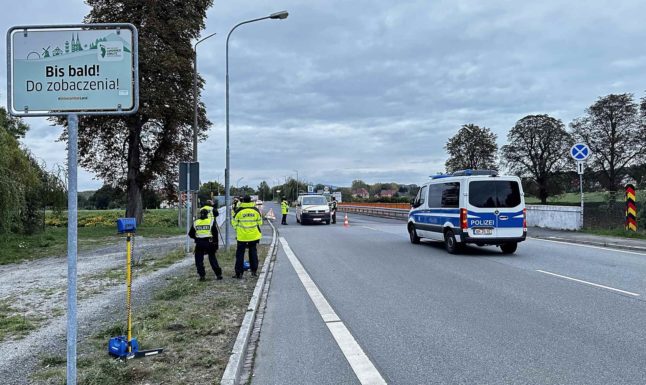Germany’s Saxon Switzerland is known for being one of the most breathtaking hiking areas in the country. So when a group of avid walkers met up in the region recently, they were likely expecting nothing more than a few days of brisk exercise and fresh mountain air.
But after a day out on the forest trails on Thursday, the group returned to their hostel and found themselves face to face with the federal police, who demanded they prove their identities.
Riham Alkousaa, a Syrian-German dual national and journalist, was among the hikers – and recounted what had happened in a widely-shared post on X.
“We are a registered hiking club in Germany, mostly Syrians from all over Germany,” she wrote.
“We went on a hike in Saxony Switzerland today and came back to our hostel to find police waiting for us. Someone called police that a group of foreigners was seen and reported as illegal refugees!”
READ ALSO: What Germany’s states want to change about migration rules
The story of the Syrian hikers rapidly went viral on social media, meeting with mixed responses from the public.
Axel Steier, a co-founder of the refugee assistance agency Seenotrettung, saw the scenario as an example of racial profiling.
“Even though you were probably able to clear things up, it shows how the poison of racism works,” he wrote.
We are a registered hiking club in Germany, mostly Syrians from all over Germany.
We went on a hike in Saxony Switzerland today and came back to our hostel to find police waiting for us.
Someone called police that a group of foreigners was seen and reported as illegal refugees! pic.twitter.com/0K4v9ju6Hd— Riham Alkousaa (@RihamKousa) November 9, 2023
Others, however, struck a less sympathetic tone.
“What’s the problem?,” one user wrote. “You’re not illegal, so that’s reason enough to laugh about it. The police did exactly what they were supposed to do. Whoever called the police – well, we have a lot of illegal refugees.”
‘Common procedure’
Though, in Alkousaa’s words, the hiking club mainly consists of “students and professionals”, their Syrian identities are likely to have played a role in the incident.
That’s because, according to a spokesperson for the federal police, residents in border areas are often relied upon to alert of the police of potentially unauthorised border crossings.
“The last few weeks and months in particular have been characterised by smuggling activities in the border regions with Poland and the Czech Republic and the associated unauthorised entries,” the spokesperson told The Local.
“In addition to a large number of our own findings and those of our partners in the cooperation, such as the Saxony state police or the Federal Customs Administration, others only became known through information from the public.”

Speaking to tabloid Bild, one police spokesperson described the investigation as a “common procedure”, adding that “everybody should expect to be checked” when in the border areas.
This was reiterated to The Local by the German Federal Police, who were contacted by police in Dresden after “people who may have entered the country without authorisation” were reportedly seen in the Bad Schandau area.
READ ALSO: Germany to toughen asylum rules as migrant influx surges
“On November 9th, 2023, a group of travellers were checked, which was the group described in the social media post. The check was completed without any follow-up measures and the people were able to continue their journey,” a police spokesperson explained.
“Irrespective of the fact that the check in question was preceded by a tip-off from a member of the public, anyone who is in the border area must expect to be checked by the Federal Police at any time.”
The police statements on border checks come at a tense moment when fears about irregular migration are rife in German society.
At a special summit this week, German federal and state politicians united over a series of measures designed to toughen up the country’s stance on migrants, including longer waits for financial support and making it easier to deport anyone who isn’t permitted to stay.





 Please whitelist us to continue reading.
Please whitelist us to continue reading.
Member comments